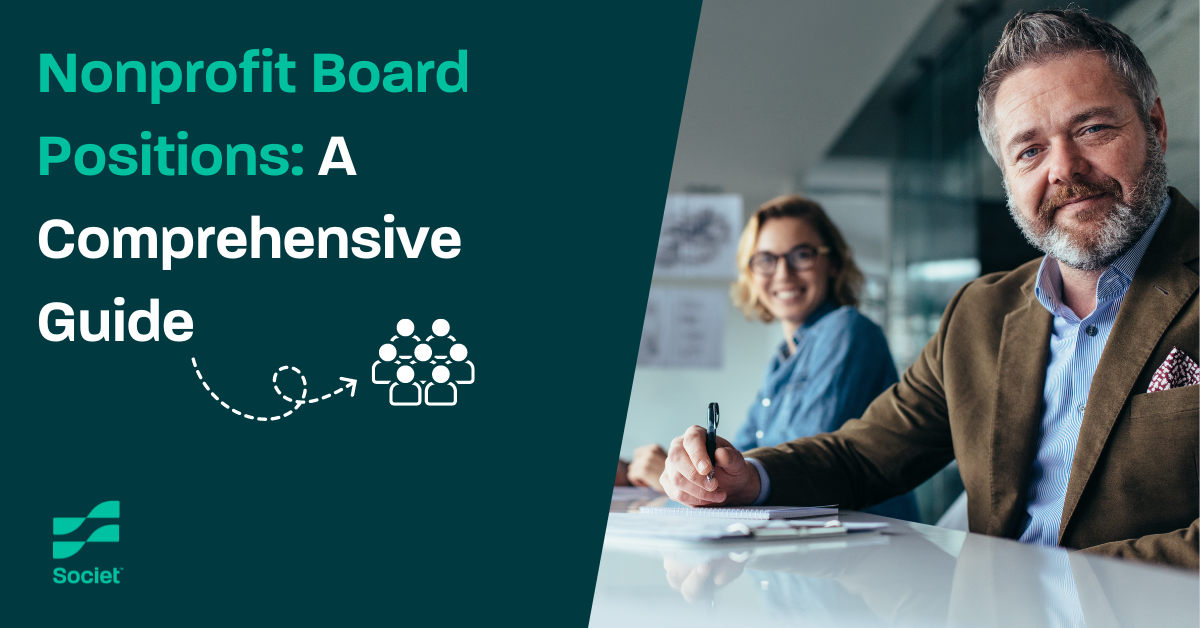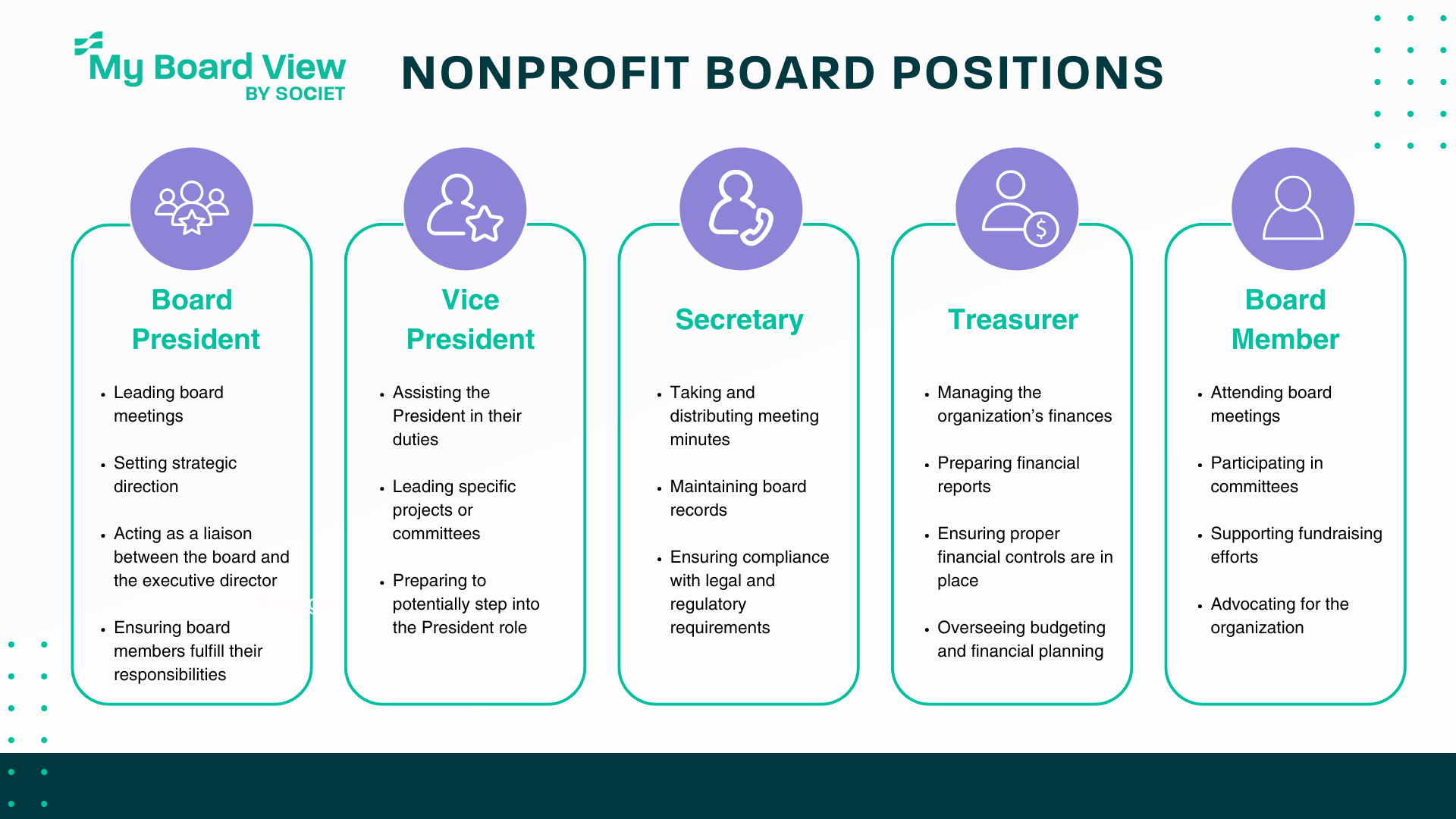
When it comes to steering the ship of a nonprofit organization, few roles are as critical as those held by board members. Nonprofit board positions are not just titles; they are pivotal roles that ensure the organization stays true to its mission, maintains financial health, and achieves its strategic goals.
In this blog, we’ll delve into the various nonprofit board positions, their responsibilities, and how to optimize your board’s effectiveness.
The Importance of Nonprofit Board Positions
Nonprofit board positions are essential for several reasons. They provide governance, oversight, and strategic direction.
Board members bring diverse skills and perspectives, which can significantly enhance the organization’s effectiveness. They also serve as ambassadors, advocates, and, often, donors.
Understanding the roles and responsibilities of each board position can help ensure your nonprofit operates smoothly and efficiently.
Key Nonprofit Board Positions

1. Board President/Chair
The Board President, or Chair, is the leader of the board. This person sets the agenda for meetings, facilitates discussions, and ensures that the board operates effectively. The President is also often the face of the board, representing the organization at events and in the community.
Responsibilities:
- Leading board meetings
- Setting strategic direction
- Acting as a liaison between the board and the executive director
- Ensuring board members fulfill their responsibilities
2. Vice President/Vice Chair
The Vice President supports the President and steps in when the President is unavailable. This role is crucial for maintaining continuity and providing additional leadership.
Responsibilities:
- Assisting the President in their duties
- Leading specific projects or committees
- Preparing to potentially step into the President role
3. Secretary
The Secretary is responsible for maintaining accurate records of board meetings and ensuring that all board documentation is up to date. This role is vital for transparency and accountability.
Responsibilities:
- Taking and distributing meeting minutes
- Maintaining board records
- Ensuring compliance with legal and regulatory requirements
To streamline your documentation process, consider using our free board meeting minutes template.
4. Treasurer
The Treasurer oversees the financial health of the organization. This role requires a keen understanding of financial management and reporting.
Responsibilities:
- Managing the organization’s finances
- Preparing financial reports
- Ensuring proper financial controls are in place
- Overseeing budgeting and financial planning
5. Board Members
General board members play a crucial role in supporting the organization’s mission. They bring diverse skills and perspectives, participate in committees, and often help with fundraising efforts.
To help keep board members informed, this Free Nonprofit Board Portal helps. Use My Board View as a centralized location for all board-related documents and communications, making it easier for board members to stay informed and engaged.
Responsibilities:
- Attending board meetings
- Participating in committees
- Supporting fundraising efforts
- Advocating for the organization
Enhancing Board Effectiveness
1. Board Training and Development
Continuous training and development are essential for maintaining an effective board. Board members should be well-versed in their roles and responsibilities and stay updated on best practices in nonprofit governance.
Check out our free nonprofit board member guide for comprehensive insights and resources to help your board members excel.
2. Succession Planning
Succession planning ensures that your nonprofit is prepared for transitions in leadership. Identify potential future leaders within your organization and provide them with the training and opportunities they need to succeed.
3. Utilizing Technology
Leveraging technology can greatly enhance board effectiveness. Tools like Sumac CRM and Sumac Case Management software can help streamline operations and improve communication.
For instance, our nonprofit CRM can help you manage donor relationships, while our nonprofit case management software can assist in tracking and reporting on your programs.
4. Regular Evaluation
Regularly evaluating board performance is crucial for continuous improvement. Use surveys and assessments to gather feedback and identify areas for development.
5. Effective Communication
Clear and consistent communication is key to a successful board. Ensure that all board members are informed and engaged. Regular meetings, updates, and open channels of communication can help achieve this.
Free Resources for Your Nonprofit Board
To further support your nonprofit board positions, we offer several free resources:
- Free Nonprofit Board Portal: This portal provides a centralized location for all board-related documents and communications, making it easier for board members to stay informed and engaged.
- Free Board Meeting Minutes Template: Streamline your documentation process with our easy-to-use template.
- Free Nonprofit Board Member Guide: This comprehensive guide offers valuable insights and resources to help your board members excel in their roles.
Conclusion
Understanding and optimizing nonprofit board positions is crucial for the success of any nonprofit organization. By clearly defining roles, providing ongoing training, leveraging technology, and utilizing available resources, you can ensure that your board operates effectively and efficiently.
Remember, the strength of your board directly impacts the success of your organization. Invest in your board members, provide them with the tools and resources they need, and watch your nonprofit thrive.
For more information on how our solutions can support your nonprofit, visit our nonprofit CRM and nonprofit case management software pages.
Empower your board today and take your nonprofit to new heights!


